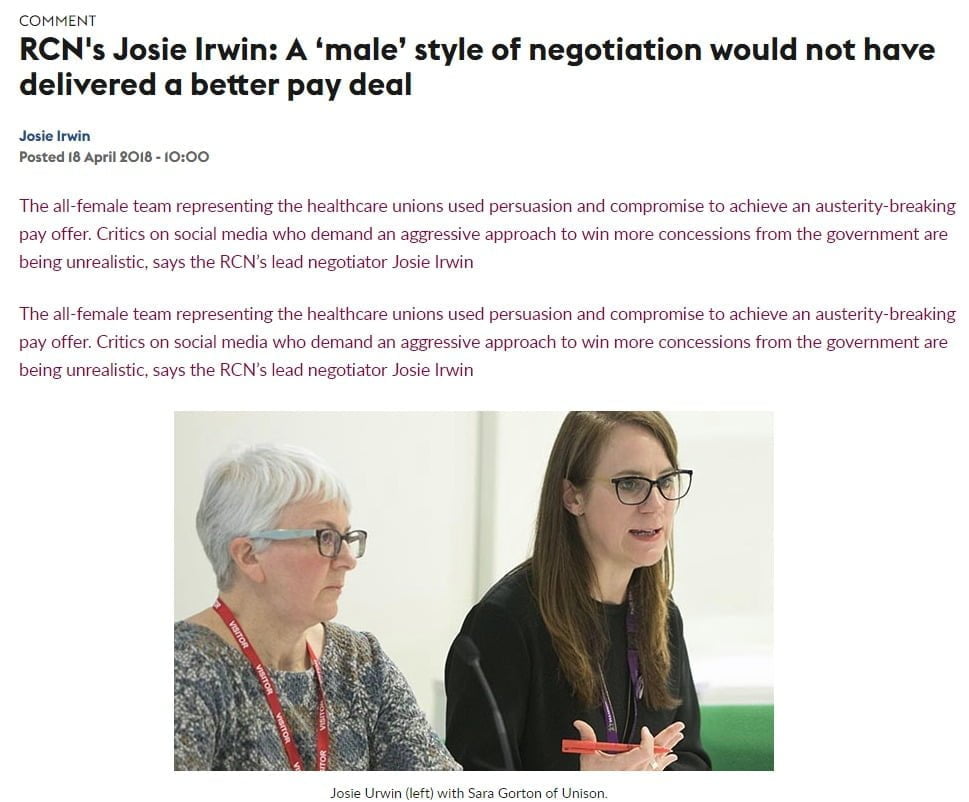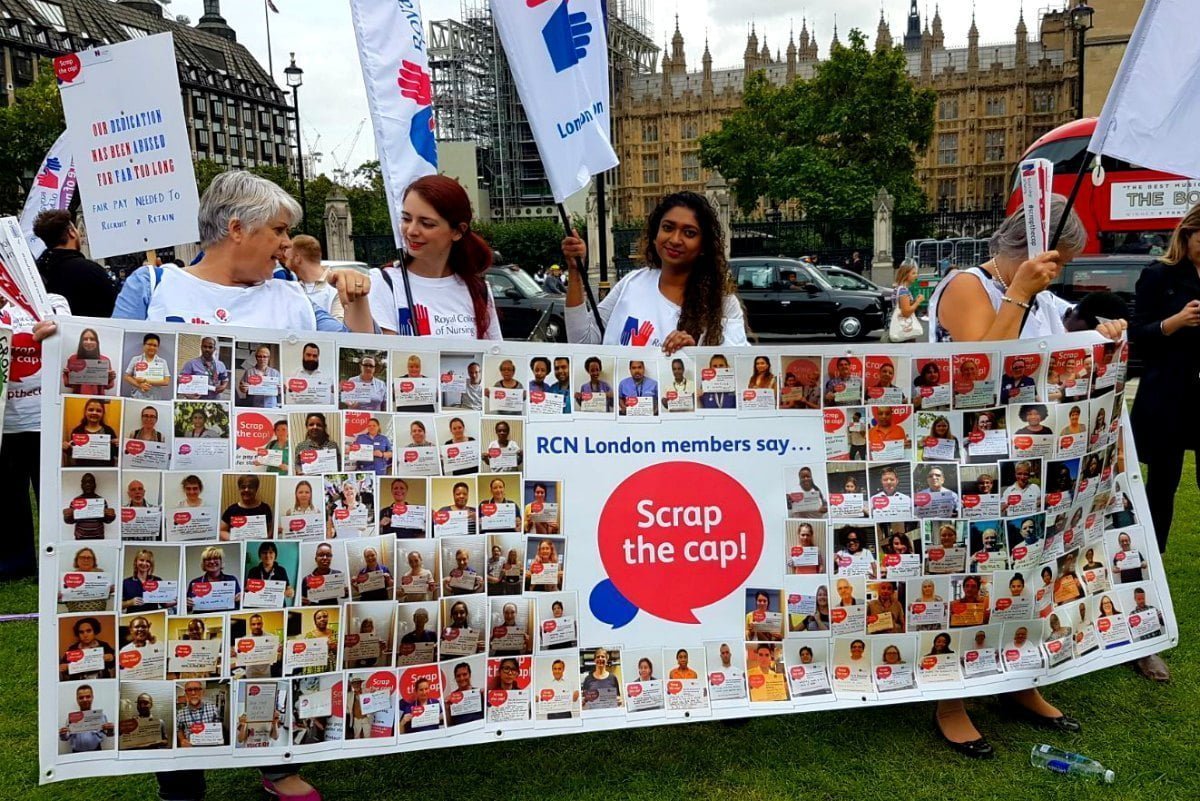Dan Langley, a nurse activist, replies to comments from RCN chief negotiator, Josie Irwin, who has attacked ordinary union members in order to justify accepting a rotten pay deal.
The nursing crisis is the deepest it has ever been in British history, with 40,000 vacancies going unfilled. Elsewhere, nurses in New Zealand are bravely striking for a decent wage, and nurses in the USA are gearing up to strike in solidarity with 50,000 workers across the University of California.
And yet, at this time, the leadership of the Royal College of Nursing (RCN) is standing in the way of progress by refusing to put industrial action on the agenda. Instead, the RCN leaders are spending their time shamelessly insulting their own membership – those who they claim to represent.
Rotten deal
 Healthcare workers have been offered a derisory pay deal by the Tory government. This deal will still see newly qualified staff starting on pay levels far below their worth. And experienced, loyal NHS staff are being given real-term pay cuts for three years.
Healthcare workers have been offered a derisory pay deal by the Tory government. This deal will still see newly qualified staff starting on pay levels far below their worth. And experienced, loyal NHS staff are being given real-term pay cuts for three years.
Despite this, Josie Irwin, the lead negotiator of the RCN, recently responded to the backlash against the deal by accusing critical union members of being “deluded” and “unrealistic”.
Furthermore, Irwin went on to suggest that industrial action, appeals to the membership, and standing up to the Tories are all “male” and “aggressive”. She even had the audacity to suggest that women are somehow more predisposed to compromise!
But in these attempts to appear progressive and pro-women, Irwin disregards the entirety of the women’s struggle. She pretends to represent a majority-women workforce, but then belittles their concerns by dismissing a backlash to the pay deal that has been mostly women-led.
This is fundamentally a sexist argument. Why should female workers have to find common ground with the Tories, who are attacking our pay and conditions? Why should critics of these cuts be painted as the patriarchy incarnate?
Refusal to compromise is far from being a “male” characteristic. In fact, militant women have played an enormous role in some of the most important revolutions and mass movements in history.
There is nothing progressive behind these gender- and identity-based arguments put forward by Irwin. No matter how many buzzwords she throws around, it does nothing to hide the fact that the trade union leaders capitulated and accepted a rotten deal.
Disconnected
Irwin demonstrates the weaknesses of these union leaders plain as day by stating that:
“Our way of working marked a change – a focus on relationship-building and persuasion, encouraging debate rather than grandstanding, rejecting aggression and discouraging antagonism between unions as well as with the employers’ side. It was about looking for common ground [with the Department of Health]”.
But this negotiation style isn’t new at all. Compromise and betrayal from trade union leaders didn’t start in 2018. It is an inherent characteristic of bureaucratic and undemocratic union leaderships, regardless of what gender they are.
Irwin’s article is devoid of any analysis or understanding of nurses’ frustrations and the real working conditions we face. She closes by saying that: “it [the pay deal] is not the best they [members] hoped for, but they understand it is probably the best they will get”’. Half of this statement is true – the offer definitely isn’t the best we hoped for!
The latter half of this sentence, however, shows how disconnected our union negotiators are from the movement. They aren’t representative of those nurses who rely on food banks; who have to put in 60+ hours at work. No, these ‘representatives’ fill their stomachs with pessimism and animosity whilst negotiating for peace and quiet.
In effect, Irwin’s view of rank-and-file nurses can be summed up as: “the membership is delusional and aggressive for not accepting a poor pay deal”.
But it is not unrealistic for nurses to be outraged at pathetic pay rises over the next three years when we’ve already lost 15% over the last eight years. Or for nurses to be furious about dire working conditions inside the starved NHS – conditions that continue to be eroded.
Reluctant leadership
 Over the last two years, the RCN leadership has gone from one extreme to another. First they accused members of not being “engaged” or “political” enough. Now they get angry when members do start to get engaged – because we are not displaying the right kind of politics!
Over the last two years, the RCN leadership has gone from one extreme to another. First they accused members of not being “engaged” or “political” enough. Now they get angry when members do start to get engaged – because we are not displaying the right kind of politics!
This contradictory behaviour has been further demonstrated by the rhetorical gymnastics and contortions that Irwin has conducted since publishing her original article a month ago.
Having previously had a go at “male”, “aggressive” opposition to the pay deal, Irwin now, in a more recent statement, has said that it was the passivity of union members – and their “reluctance to strike” – that has tied her hands in negotiations.
In other words, one minute she is opposing industrial action for being too “aggressive”; the next she is accusing grassroots RCN members of not wanting to go down the path of industrial action.
But we must make it clear: it is not ordinary nurses who are “reluctant” to take strike action, but our unrepresentative union leaders, who refuse to offer a fighting lead.
If the RCN leadership were to launch a genuine campaign for strike action, co-ordinated along with other unions in the NHS and the wider public sector, then this would undoubtedly be supported by the majority of nurses. This is the kind of ‘engagement’ that we need.
What we do not need is the kind of ‘engagement’ being offered by the RCN leaders: repeating falsehoods about the pay offer; trying to sweep justified criticisms under the carpet; blaming rank-and-file nurses and RCN members; and doing everything they can to hide the fact that we are a trade union.
For a fighting union!
Irwin’s position has not gone down well within the nursing community. It is reflective of the passive attitude of the RCN leaders that ordinary members are sick and tired of.
The RCN leadership has arbitrarily stated that we will now have to wait 12-18 months before we can fight for fair wages again. They have attempted to scare and threaten the membership by saying that, “if we reject this deal, we will have to go back to a 1% offer” (even though this has never been explicitly stated).
If the deal is rejected, then the only answer is clearly to escalate and call for industrial action. This is why the RCN needs to be democratised and become a truly member-led union. Because once nurses begin to move en masse, compromising and passive ‘representatives’ like Irwin will be swept aside and replaced by genuine fighters of our movement.






